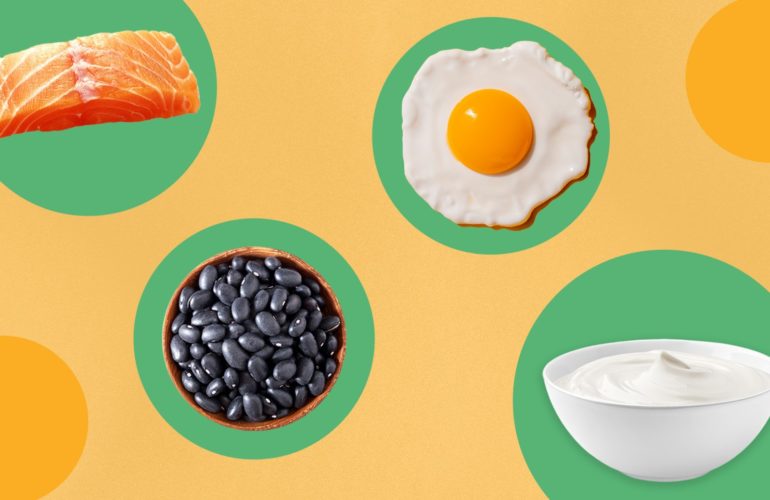Protein is the vital macronutrient that plays a major role in the functioning of our body, and is required to be in adequate proportions for our system to work efficiently. Protein is found throughout the body—in muscle, bone, skin, hair, and virtually every other body part or tissue.
More about protein!
Protein is made from twenty-plus basic building blocks called amino acids, which can be categorized into two types such as Essential & Non Essential Amino Acids ( protein).
Our bodies make amino acids in two different ways: either from food( Essential) , or by modifying others or getting them from diet( non essentials).
9 Essential amino acids—histidine, isoleucine, leucine, lysine, methionine, phenylalanine, threonine, tryptophan & valine—must come from food.
We don’t store amino acids, hence we need protein for our body on day to day basis.
What is the function of PROTEIN in our bodies?
Protein plays a role in many bodily processes, including:
- Boosts metabolism through thermogenic effect.
- Muscle building.
- Hormonal balance.
- Growth and maintenance,
- Maintains ph.
- Strengthens immunity system response.
- Provides structure ( collagen).
- Aids Transport and store nutrients.
- Blood clotting.
- Manages Fluid balance.
- Enhances Vision.
- Strengthens functioning of enzymes.

Protein is important for growth and development, especially during
childhood, adolescence, and pregnancy. Very low protein intake or protein deficiency can lead to:
- Weak muscle tone.
- Edema or swelling due to fluid retention.
- Thin, and brittle hair.
- Skin lesions.
- Loss of muscle mass, particularly in adults.
- Growth deficits, particularly in children.
- Hormone imbalances.
Incomplete & Complete Protein.
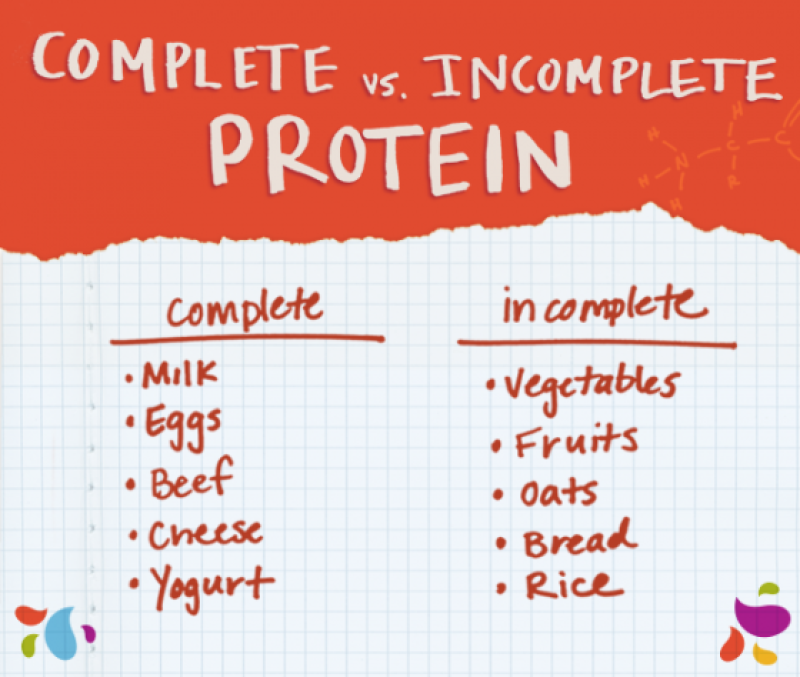
Proteins can also be classifies as complete and incomplete proteins alike essential and non-essential amino acids.
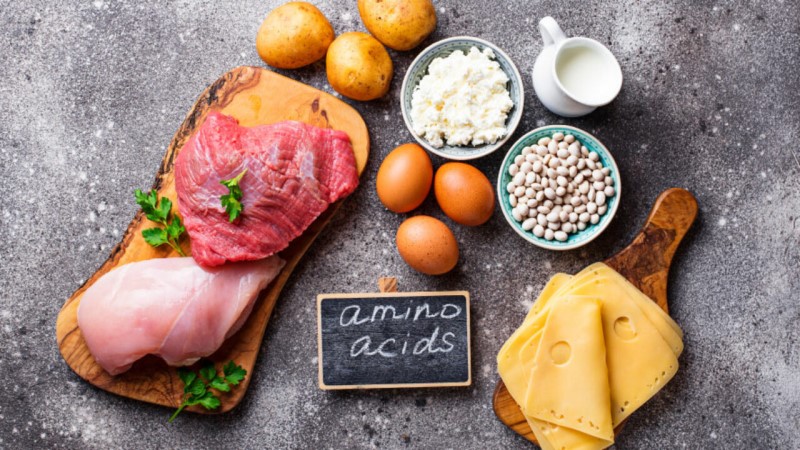
Animal protein has all 9 essential amino acids and is hence considered complete protein.
Milk & milk products, eggs, chicken, meat, fish are complete sources of protein.
Whereas, Plant protein sources are mostly incomplete proteins.
Protein rating.
Protein digestibility-corrected amino acid score (PDCAAS) is a method of evaluating the quality of a protein based on both the amino acid requirements of humans and their ability to digest & absorb it.
1 is the highest value of PDCAAS score.
| FOOD SOURCES | PDCAAS SCORE |
| Milk | 1.00 |
| Whey | 1.00 |
| Eggs/Chicken | 1.00 |
| Soy Protein Isolate | 1.00 |
| Beef | 0.92 |
| Soy | 0.91 |
| Chickpeas/ Channa | 0.74 |
| Peas | 0.67 |
| Oats | 0.58 |
| Wholewheat | 0.45 |
Tips:
- Look for Protein to carb or Fat Ratio.
- Consume more lean quality protein for Weight Loss.
How much Protein in a day ?
- Daily Protein Intake: 0.8g/kg of your body weight for an average adult with low activity levels.
- Increase protein intake with increase in activity levels ( Weight training).
- 35-40% of your daily calories should come from protein.
Protein requirement as per Dietary Guidelines:
| AGE | PROTEIN REQUIREMENT |
| Children less than 4 years. | 13 gm |
| Children aged 4-8 years. | 19 gm |
| Children aged 9-13. | 34 gm |
| Women and girls aged 14 and over. | 46 gm |
| Boys aged 14-18. | 52 gm |
| Men aged 19 and over. | 56 gm |
EXCEPTION: You need High amount of daily protein if your are pregnant & nursing mother.
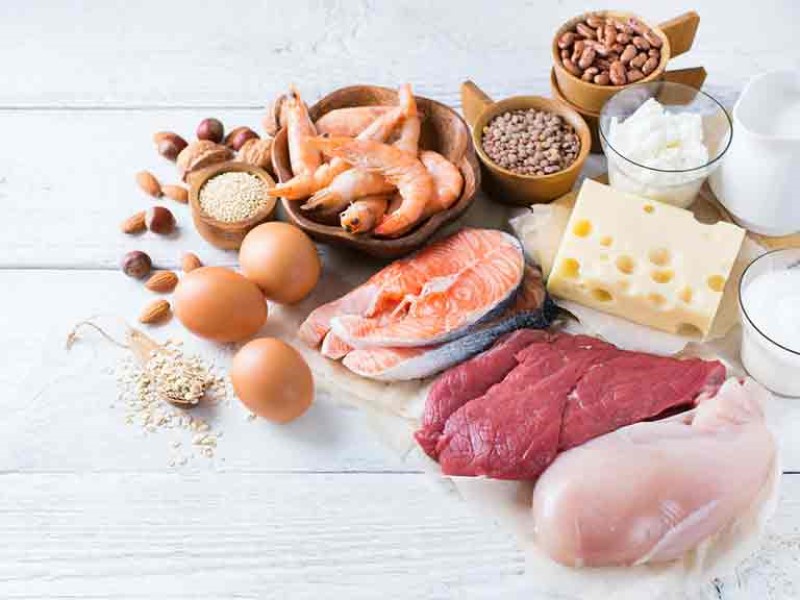
Protein Composition in each Food Source.
| Sno. | FOOD | RAW AMOUNT (gm) | CUP MEASURE | CALORIES | PROTEIN (gm) | CARBS (gm) | FAT (gm) |
| 1 | Milk Normal. Skimmed. | 250 ml 320 ml | 1 cup 1.4 cups | 180 Kcal 95 Kcal | 8 gm 8 gm | 11 gm 15 gm | 10 g |
| 2 | Grains. | 20 gm | 1 roti/bread (wholewheat) | 70 Kcal | 2 gm | 15 gm | 1 gm |
| 3 | Pulses and Legumes. | 30 gm | 3 tbsp. | 100 Kcal | 7 gm | 17 gm | |
| 4 | Meat. | 40 gm | 2 pcs./1 egg. | 70 Kcal | 7 gm | 5 gm |
Is Protein powder/ Shakes for Muscle Building Necessary : Yes or No ?
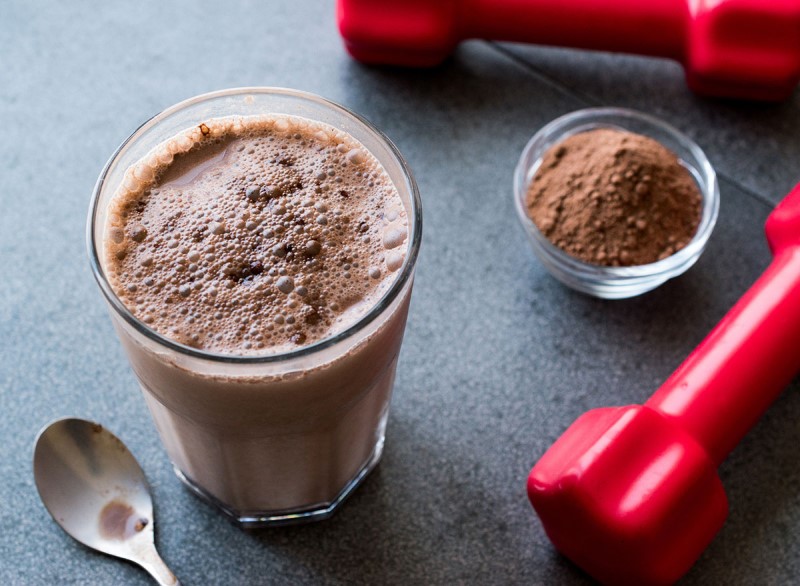
Protein Powder / shakes are just dietary supplements that help to balance the intake of protein in a day.
It is not absolutely necessary for people trying to stay fit or gain muscle mass.
It is recommended only if your requirement for protein is not met by the food you eat daily.
Myths & Facts About Protein?
Consuming large amount of protein in one meal ?
Since your body can’t store amino acid for future use, the extra protein might be used or stored as energy in your body,
If you overeat protein, this extra protein can be converted into sugar or fat in the body. Higher amount of protein in one meal can cause indigestion like bloating, gas or acidity. Smartness is the key, be practical and smart when it comes to eating.
Increase your fluid/ Water intake with increase intake of Protein ?
Protein restriction is helpful for people with preexisting kidney problems, but there’s no evidence that protein can cause kidney damage in healthy people.
